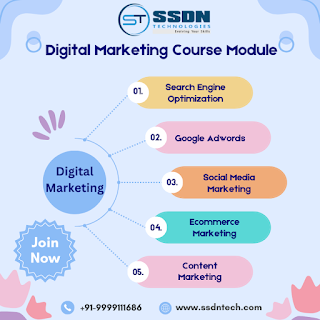How does paid advertising differ from organic methods in digital marketing?
In the ever-evolving realm of digital marketing, professionals and businesses are presented with a myriad of strategies to enhance their online presence. Two fundamental approaches that often take centre stage are paid advertising and organic methods. Whether you're considering a Digital Marketing Course, pursuing a Digital Marketing Certificate, or seeking an Advanced Digital Marketing Course, understanding the nuances between these methods is crucial for success in the competitive digital landscape. Let's explore how these strategies differ and how they contribute to the overall digital marketing framework.
Paid Advertising: Unleashing the Power of Precision
When it comes to achieving immediate visibility and targeted exposure, paid advertising stands out as a powerful tool in the digital marketing arsenal. Advertisers can strategically position their content in front of a specific audience through platforms like Google Ads, social media advertising, and other paid channels. These campaigns often operate on a pay-per-click (PPC) model, allowing marketers to allocate budgets with precision and track the return on investment (ROI) in real time.
For those eyeing a Digital Marketing Institute or a Digital Marketing Academy, paid advertising provides a fast track to reaching potential customers. Sponsored content ensures that your message reaches a curated audience, maximizing the chances of conversion. However, the effectiveness of paid advertising is directly tied to budget allocation and the ability to refine targeting parameters, making it imperative for marketers to stay well-versed in the latest tools and strategies.
Organic Methods: Cultivating Sustainable Growth
On the flip side, organic methods emphasize building a strong and sustainable online presence without relying on paid promotions. This approach involves optimizing your website's content for search engines (SEO), creating valuable and shareable content, and engaging with your audience through social media and other online platforms. For those considering a Digital Marketing Certificate, mastering organic methods is key to establishing a long-term, reputable digital footprint.
Unlike paid advertising, organic methods require patience and persistence. Achieving higher rankings on search engine results pages (SERPs) and building a loyal online community take time. However, the payoff is significant. Once established, organic traffic becomes a consistent and cost-effective source of leads and conversions. Investing in an Advanced Digital Marketing Course can equip professionals with the skills needed to navigate the complexities of SEO, content creation, and social media management.
Striking a Balance: The Integrated Approach
While paid advertising and organic methods each have their strengths, the most effective digital marketing strategies often involve a thoughtful combination of both. A holistic approach allows businesses to capitalize on the immediacy of paid advertising while simultaneously cultivating a sustainable, long-term presence through organic methods.
Whether you're aspiring to enrol in a Digital Marketing Course, attain a Digital Marketing Certificate, or deepen your expertise with an Advanced Digital Marketing Course, understanding the dynamic interplay between paid and organic methods is essential. Digital Marketing Institutes play a crucial role in providing comprehensive education on both fronts, empowering professionals to navigate the complexities of the digital marketing landscape with confidence and expertise. In today's competitive environment, mastering these strategies ensures not only visibility but also longevity in the ever-evolving world of digital marketing.
Website:- https://www.ssdntech.com/online-marketing/digital-marketing-course Contact Number:- 9999111686




Comments
Post a Comment